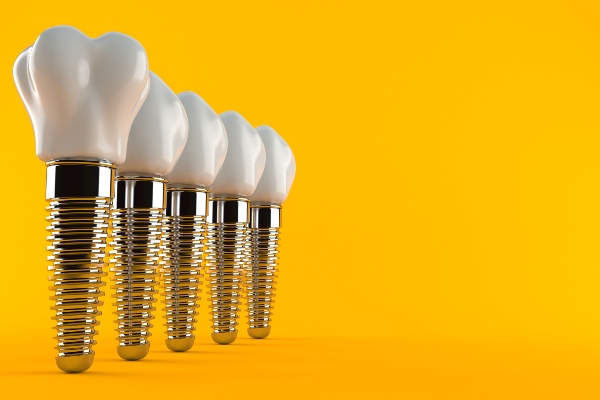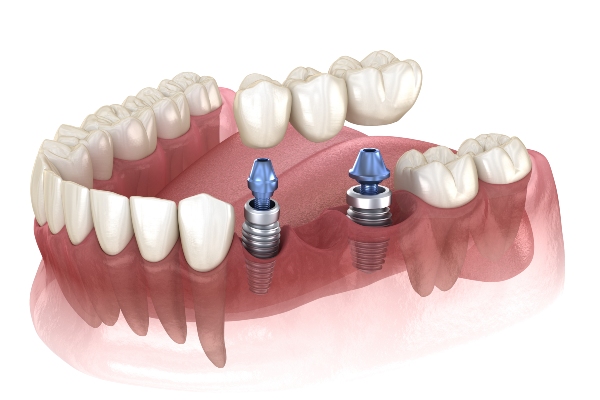What To Ask Your Dentist About Dental Implants

Dental implants are a popular choice for patients wanting to replace missing teeth. Formerly, partial dentures and dental bridges were the go-to treatments. However, implants have many advantages. They are more stable than removable dentures and typically last longer than bridges. Using this prosthesis, a dentist can replace a single missing tooth without disturbing any other teeth.
Many patients are not aware of what happens during the dental implant process. Before beginning this treatment, patients should understand certain things about this restoration.
5 questions to ask about dental implants
Patients interested in dental implants should first see a dentist for a consultation. At this appointment, the dentist takes initial X-rays and presents a treatment plan. The patient has the opportunity to ask questions and address concerns. The more informed the patient is before the treatment begins, the better the outcome will be.
1. Am I a candidate?
The patient should first ask the dentist if enough bone support is present for a dental implant. Patients with a history of gum disease or severe dental abscesses may need additional bone grafting procedures before the dentist can place the prosthesis.
If the patient has a compromised immune system, there may be concerns about healing after the dental surgery. It is essential that the patient and dentist thoroughly discuss the advantages and disadvantages of all treatment options.
If the dentist determines that the patient is not a candidate for dental implants, they can discuss other treatment options. Although implants are a viable restorative option, there are other procedures to replace missing teeth.
2. How long will the process take?
Many patients are unaware of the length of time this procedure takes. After placing the implant screw, the dentist covers the site and allows it to heal for three to six months. After that, the dentist uncovers the screw and attaches a permanent restoration.
If the patient's bone requires grafting, the treatment time will be longer. Patients should prepare to spend several months waiting to restore the prosthesis. Patients can ask what temporary restoration the dentist will provide.
3. What are the risks of not replacing the tooth?
Missing teeth can cause many problems for a patient. Adjacent teeth can drift into the space, and this can cause issues with the patient's bite. Bone loss can occur where the tooth is missing, and the patient may also experience difficulty chewing. Patients should always ask the dentist about the risks of not performing the treatment. This way, patients can make informed decisions about dental care.
4. What are the different types of dental implants?
The two main types of dental implants are endosteal and subperiosteal. The biggest difference between these two is how they are installed.
Endosteal implants, usually made of titanium blades or cylinders, are surgically installed into the jawline. After this is done, 4-6 weeks will pass so the implant can undergo a process called osseointegration. This is the process by which the jawbone fuses with the implant. Your dentist will then install new teeth into the implant.
Subperiosteal implants are slightly different, as they are placed on top of the jawbone and underneath the gum tissue. These take less time to heal. This type of implant is generally used if endosteal implants are not ideal. A subperiosteal implant may be used if, for instance, your jawbone cannot naturally support an endosteal implant or you do not want to undergo bone grafting.
5. Do dental implants require special care?
Taking care of dental implants is very similar to taking care of natural teeth. While dental implants cannot get cavities, the soft tissue surrounding a dental implant still needs care to prevent infection. This means routinely brushing and flossing and seeing your dentist so he or she can check for problems you would not be able to spot on your own.
If you smoke, your dentist will probably advise you to stop. Smoking tobacco can harm dental implants and disrupt the healing process.
Dental implants can stain just like regular teeth, so avoiding substances that can stain teeth such as coffee and black tea is generally a good idea.
Conclusion
In recent years, dental implants have changed the face of dentistry. Patients have more options than ever before and can form a comprehensive treatment plan with a dentist to address their specific needs. Patients needing more information about this procedure should call for a consultation appointment today. The path to a beautiful, healthy smile begins with quality dental restorations, and dental implants can be the right choice.
Request an appointment here: https://www.summitfamilycosmetic.com or call Summit Family & Cosmetic Dentistry at (908) 516-3833 for an appointment in our Summit office.
Check out what others are saying about our dental services on Yelp: Dental Implants in Summit, NJ.
Related Posts
Dental implants are the most stable dental restorations you can get. The invasive procedure will cut through your gum tissue. The dentist will drill into the jawbone and place titanium rods into the holes. The right kind of care is important to make sure that the implant site is free from infections. Here are the…
Dental implants are effective, long-lasting artificial teeth. Implants are surgically attached to the jawbone to look and function like natural teeth. As a result, patients can chew, talk, and laugh without worrying about dentures slipping. They also improve oral health. This article explores when and why to get implants and the qualifying factors for treatment.Patients…
Many types of dental implants are available. There are also many ways to attach them to your jawbone and gums. Working with your dentist can determine the right implants. Here are the different types of dental implants that are right for your dental needs.These restorations have titanium rods that the dentist inserts into the jawbone.…
Using proper deep teeth cleaning techniques can help prevent serious oral health problems in the future. However, some people are hesitant to have this procedure done because they are concerned about the amount of time that it will take for their gums to heal properly afterward. Here, we explain how long it takes for the…


